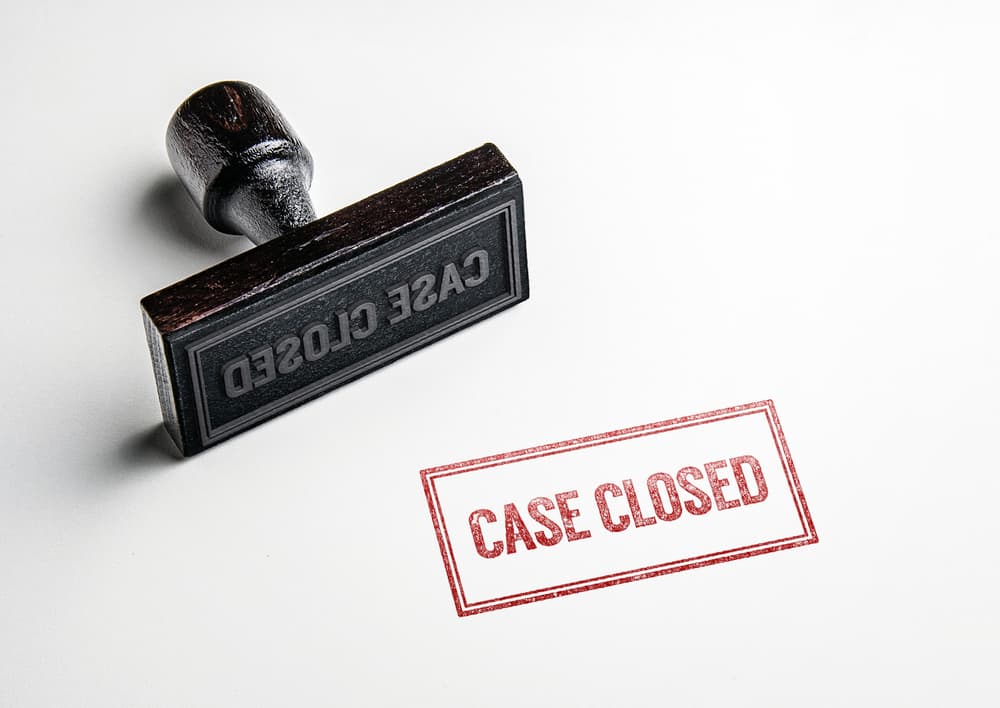Countless Americans face the constant risk that their wages or bank account funds could be garnished due to outstanding debts.
Debt lawsuits in the U.S. are a part of the financial system that often gets ignored, partly because of a common and misguided belief that individuals who fail to pay their debts deserve the consequences.
Facing a lawsuit over debt is intimidating, and it only adds to the stress that people who cannot pay their debts already feel.
The good news is that there is some light at the end of the debt tunnel that can lead to getting a debt lawsuit dismissed.
If someone sues you over past due debt, contact a debt collection defense attorney for help with legal proceedings and defenses that could result in a dismissal of your case.
What Does It Mean to Get a Debt Lawsuit Dismissed?
A dismissal means that the court has decided to close the case, either temporarily (without prejudice) or permanently (with prejudice), due to various potential reasons.
Grounds for a Dismissal
- Lack of Jurisdiction. The court may not have the authority to hear the case due to factors like the location of the parties or the subject matter.
- Improper Service of Process. If you weren't served with the lawsuit papers according to legal procedures, the case could be dismissed.
- Statute of Limitations Expired. Debt lawsuits are subject to a statute of limitations. If a creditor or collector files a lawsuit after this period has expired, the court can dismiss the case.
- Insufficient Evidence. The plaintiff (creditor or collector) must prove you owe the debt. If they fail to provide adequate evidence, the case may be dismissed.
Understanding Your Debt Lawsuit Case

To determine the best strategy for dismissal, you need to thoroughly understand the specifics of the lawsuit filed against you.
This involves reviewing the complaint, identifying who is suing you (original creditor or debt collector), the amount they claim you owe, and any other relevant details.
Responding to the Lawsuit
Regardless of the strategy you choose, it’s essential to respond to the lawsuit within the specified timeframe, typically 20 to 30 days from when you receive the summons.
Failing to respond can lead to a default judgment against you, where the court automatically rules in favor of the plaintiff without considering your defense.
If a default judgment is entered against you, you could get your wages garnished. A study done by ADP found that 3 percent of all employees had wages taken for consumer debts. It’s statistics like these that emphasize the importance of getting a debt lawsuit dismissed.
Facing a debt lawsuit doesn't have to mean accepting defeat. With the right knowledge and legal guidance, you can take informed and proactive steps to address the lawsuit and seek a resolution in your favor.
How to Challenge the Validity of a Debt Lawsuit
Challenging the validity of the debt lawsuit is a critical step in your defense. This involves scrutinizing the details of the case brought against you and identifying any inconsistencies or legal shortcomings that could lead to dismissal.
Dispute the Debt Ownership
One of the first things to verify is whether the party suing you owns the debt. Especially in cases where debts are bought and sold by collection agencies, documentation proving ownership can sometimes be inadequate.
If the plaintiff cannot prove they legally own the debt, you may have grounds for dismissal.
Question the Amount Owed
It's not uncommon for there to be discrepancies in the amount claimed by the creditor or collector. Review the amount they state you owe carefully.
If there are inaccuracies or inflated figures due to unjustified fees or interest, point these out in your response.
Highlight Any Procedural Errors
The legal process for filing and serving a lawsuit is governed by strict rules. If these rules aren't followed—for instance, if you were not properly served with the lawsuit papers—this could be grounds for dismissal.
You have the right to challenge the lawsuit based on these procedural missteps.
Responding Timely to Avoid Default Judgment
It’s imperative to respond to the lawsuit within the deadline mentioned in the summons.
A failure to respond can result in a default judgment, which automatically favors the plaintiff.
A formal response is necessary to avoid this outcome even if you believe the lawsuit is unfounded.
By challenging the lawsuit's validity on these grounds, you may be able to have the case dismissed.
This stage often requires careful analysis of legal documents and a strong understanding of legal procedures, making it advisable to seek guidance from a lawyer experienced in debt lawsuits.
Check the Statute of Limitations for Debt

One of the most effective defenses in a debt lawsuit is the statute of limitations. This legal concept sets a time limit within which a creditor or collector must initiate legal action to collect a debt.
Once this period expires, the debt is considered "time-barred," and you can use this as a defense to get the lawsuit dismissed.
Understanding the Statute of Limitations
- The statute of limitations varies depending on your state and the type of debt. It typically ranges from three to six years but can be longer in some jurisdictions.
- The clock generally starts ticking from the date of your last payment or when the account became delinquent.
How to Determine If the Statute of Limitations Applies
- Review the details of the debt to determine when the statute of limitations started.
- Compare this date with the date the lawsuit was filed. If the lawsuit was filed after the statute of limitations expired, you can argue that the debt is time-barred.
Be Cautious with Old Debts
- Be aware that making a payment or acknowledging an old debt can restart the statute of limitations.
- Avoid making any commitments or agreements on a debt until you have verified its status since the time limit to seek a remedy through the court system may have passed.
Raise the Statute of Limitations Defense in Your Response
- If you believe the statute of limitations has expired, include this defense in your response to the lawsuit.
- Provide evidence, such as payment history or account statements, to support your claim that the debt is time-barred.
Relying on the statute of limitations can be a powerful defense in a debt lawsuit. However, it's important to research and understand the specific laws in your state and to respond appropriately to the lawsuit to effectively use this defense.
Seeking legal advice can also provide clarity on whether this defense applies to your case and help you navigate the process effectively.
How to Demand Proof of a Debt
Another key defense strategy in a debt lawsuit is demanding proof of the debt. This involves requesting the creditor or debt collection agency to provide clear and comprehensive documentation that substantiates their claim.
This step is very helpful when trying to get a debt lawsuit dismissed because debt collectors may not always have complete information about the original debt.
Exercise Your Right to Validate the Debt
- Under the Fair Debt Collection Practices Act (FDCPA), you have the right to request validation of the debt. This means the collector must prove that the debt is yours and the amount they claim is accurate.
- Send a debt validation letter within 30 days of the collector's first contact. This letter should ask for detailed information about the debt, including the original creditor's name, the amount of the debt, and a copy of any agreement that creates the debt obligation.
What Proof Should You Expect
- The collector should provide copies of original documents related to the debt, such as the credit agreement or contract.
- They should also show a detailed account history, including any payments made and interest or fees added.
What if the Debt Collector Does Not Comply with Your Verification of the Debt?
If the collector fails to provide adequate proof of the debt, you can challenge the lawsuit on these grounds.
- Until they provide proof, they are typically not allowed to continue collection efforts.
What to Include in Your Legal Response
- If you have requested debt validation and have not received satisfactory evidence, include this point in your response to the lawsuit.
- Emphasize any discrepancies or lack of evidence in the collector’s claim.
Demanding proof of debt is a powerful tool in your defense against a debt lawsuit. It not only ensures that the collector's claims are legitimate but also provides an opportunity to assess the accuracy of the debt amount claimed.
As with any legal matter, consider seeking advice from a lawyer with experience in debt collection and the FDCPA to guide you through this process and ensure your rights are fully protected.
How to Identify Legal Errors from Debt Collectors
In a debt lawsuit, procedural inconsistencies or errors made by the creditor or debt collector can sometimes provide grounds for dismissal.
It's important to be vigilant about the legal process and ensure that all procedures have been followed correctly.
Identify Common Procedural Errors
- Improper Service. The lawsuit papers must be served according to state laws. If you weren’t served properly, this could be a basis for dismissal.
- Incomplete or Inaccurate Documentation. Check for any inaccuracies in the lawsuit documents, such as incorrect names, amounts, or missing details.
- Failure to Follow Court Procedures. Creditors and collectors must comply with all court rules when filing a lawsuit. Any failure in this regard can be challenged.
Take Action on Errors in the Debt Lawsuit
- If you identify any procedural inconsistencies, raise these issues in your response to the lawsuit.
- Provide specific details and evidence of the errors to strengthen your case.
Document All Interactions with Creditors
- Keep a detailed record of all interactions and communications related to the lawsuit.
- Document dates, times, and the content of conversations, as well as keeping copies of all written correspondence.
Use Procedural Defenses Strategically
- While procedural errors can be a strong defense, they may not resolve the underlying issue of the debt.
- Consider using procedural defenses in conjunction with other strategies, such as challenging the debt's validity or the statute of limitations.
Procedural inconsistencies, if significant, can lead to a dismissal of the debt lawsuit; however, approach this defense with a thorough understanding of legal procedures and the specifics of your case.
A debt defense trial lawyer can offer valuable insight and guidance in identifying and leveraging these procedural errors effectively.
Seek the Advice of a Debt Collection Defense Attorney
When facing a debt lawsuit, one of the most important steps you can take is to seek legal assistance.
An attorney who focuses on debt law can provide invaluable guidance and representation, increasing the likelihood of getting the debt lawsuit dismissed.
What Are the Benefits of Legal Representation?
- Experience in Debt Collection Laws. A lawyer experienced in debt lawsuits will have a deep understanding of the relevant laws and legal procedures. They can identify the best defense strategies for your specific case.
- Handling Legal Documentation and Responses. A debt defense attorney can ensure that all responses and documents are filed correctly and on time, which is crucial in avoiding a default judgment.
- Negotiation Skills. Lawyers are adept at negotiating with creditors and collectors. They may be able to negotiate a settlement or payment plan that is more favorable to you.
- Court Representation. If your case goes to court, having a lawyer represent you can greatly impact the outcome. They can present your case effectively and argue on your behalf.
How to Find the Right Debt Defense Lawyer
- Look for an attorney with experience in consumer debt cases.
- Consider the lawyer's track record and positive results in similar cases and their approach to debt defense.
- Many lawyers offer a free initial consultation, which can be a good opportunity to discuss your case and understand their fee structure.
Weighing the Cost vs. Benefit
- While hiring a lawyer involves costs, weigh this against the potential financial impact of losing the lawsuit. In many cases, the benefits of legal representation can far outweigh the costs, and some debt defense attorneys take cases on a contingency basis.
Seeking legal assistance can make a significant difference in the outcome of a debt lawsuit. A skilled attorney can navigate the complexities of the case and advocate for your best interests, providing you with the best chance of getting the lawsuit dismissed.
Contact a Debt Collection Lawsuit Attorney
At Kazerouni Law Group, we understand the importance of accessible legal guidance when facing a debt collection lawsuit.
That's why we provide free consultations and case evaluations, ensuring that you can explore your options without any financial obligation.

Our experienced debt defense attorneys will thoroughly review your case, offering personalized advice on the most effective way to proceed.
An experienced consumer protection attorney can significantly shift the odds in your favor in a debt lawsuit.
To take the first step in addressing your legal concerns, call us at 800-400-6808 or contact a debt defense lawyer online. Find out how we can help you today.